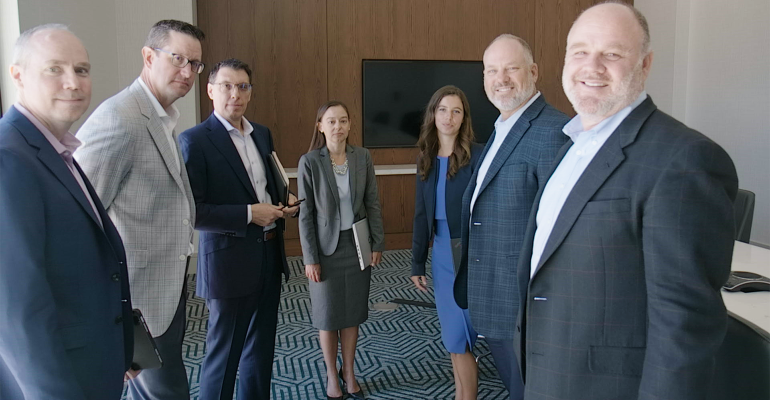Two teams of advisors from Wells Fargo Private Bank and Bank of America Private Bank have come together to create a new registered investment advisory firm, Fidelis Capital. The Tampa, Fla., and Dallas-based teams previously managed a total of $6 billion in assets for a little under 200 high-net-worth and ultra-high-net-worth families.
The teams say they want to bring private banking services to the independent space, at a time when they say the big institutions are cutting back on those services.
“[These advisors] have spent their careers serving really complex families; they’ve struggled to do that at the national large banks because of the transition the industry is under,” said Rick Simonetti, who was the senior managing director of the southern region and national head of wealth planning at Wells Fargo Private Wealth Management, and will now serve as CEO of Fidelis. “It does tell you it’s industry-wide, as opposed to company-specific, when two teams come together and realize that they can actually build something that serves those clients the way they’ve always wanted to, and the way they originally got into the business.”
In addition to Simonetti, Fidelis also includes Tampa-based advisors Matthew Michaels, who has 25 years of experience in the industry, most recently as a portfolio manager at Wells Fargo; and Paul Ayotte, who has over 24 years of experience, most recently with Wells Fargo Private Bank. Fidelis also recently added Johnathan L. Butler, trust specialist and relationship manager, and Nick Smith, investment research analyst, both from Wells Fargo Private Bank.
The Dallas office of Fidelis includes Co-Chief Investment Officer Neale Ellis, former managing director and senior portfolio manager at Bank of America Private Bank; and his brother, Matthew Ellis, former managing director at Wells Fargo Private Bank, who will serve as president. They’re joined by Libby Castle, relationship manager.
The firm is using Fidelity as its custodian. Their growth plan, they say, includes mergers and acquisitions and recruiting new advisors to the firm, and they’re not limited by geography.
Fidelis caters to ultra-wealthy families and will provide investment and specialty asset management, business transition advisory services, wealth, estate, and tax planning, personal risk management, bill pay and reporting, and fiduciary lending services, among other services.
Michaels says the current crop of private banks are "failing on three promises." The first is that they’re going to surround a client with a team of specialists that knows that client and will be with them for the long term.
“What we’ve seen there is that those teams have slowly started to be dismantled or deconstructed,” Michaels said. “Or maybe there’s less people that are on the team full time, and other ones, maybe they just come in as needed. What that means for the client is you’re no longer getting proactive advice, you’re getting reactive advice.”
“It’s happened at all the firms,” Simonetti said. “They’re tending toward that ‘a banker,’ or ‘a person,’ not the client’s person, and we’re going to change that.”
The second promise is that the private bank is going to deliver a high level of bespoke, white-glove services and provide an extraordinary client experience.
“That’s something we’ve seen change over time because there’s this desire to grow, there’s certain decisions out there to cut costs and be more efficient,” Michaels said. “The impact to the client is, advisors are having less time because they’re serving more clients.”
The third promise is that they’re going to surround the client with a breadth of resources.
“One of the things private banks were really good at for a long time was having all these different business lines and all these different specialties, that can help clients out, whether it was lending on a piece of artwork, or getting access to really unique private investments,” Michaels said. “What we’ve slowly seen in the industry is some of these resources are sold off, or they’re no longer a line of business, or they’re offered but in a very diluted way.”
“So as an advisor, you’ve got less time, less people that are collaborating with you, and you don’t have all the resources you once had to serve the clients.”
Michaels added that the private banks are not keeping their technology up to date either.
“The world has changed so much, and the way our clients want to interact with us has changed,” he said. “And often what you find in the big private banks and big institutions is that technology is dated and it doesn’t necessarily give information in the way clients wish to receive it.”
“The way we’re going to be able to interact with clients is going to be exactly what they want. And as technology continues to change, which we expect it will, we’ll be able to adapt.”
Fidelis’ approach to hiring and developing next-gen talent is also different from the large institutions, Michaels said.
“In a large organization, they do what’s called ‘just in time hiring.’ So somebody leaves, we got to reassign or hire someone,” he said. “We wanted to make sure that doesn’t happen at Fidelis, so we’ve committed to this idea of hiring the next-generation advisor—that succession plan, from day one, so that our clients over the course of years will get to work with that next advisor so that if and when something happens, the client’s not going to be in one of those experiences where they have to meet someone new and download that person.”
They already have one person serving in this relationship management role, and as they grow and add clients, they’ll continue to hire into this role. The firm also uses metrics to provide a line of sight into how many younger advisors they’ll need, Simonetti said.




